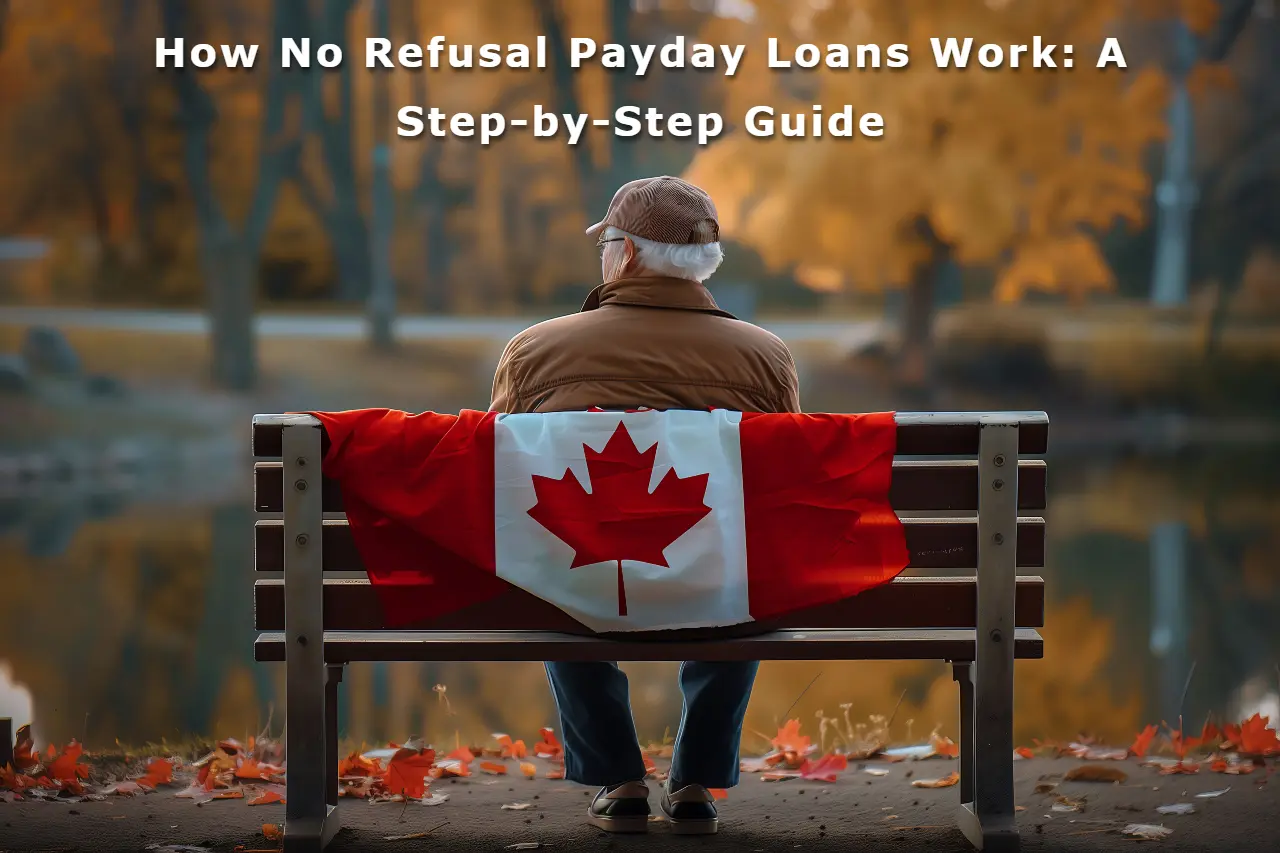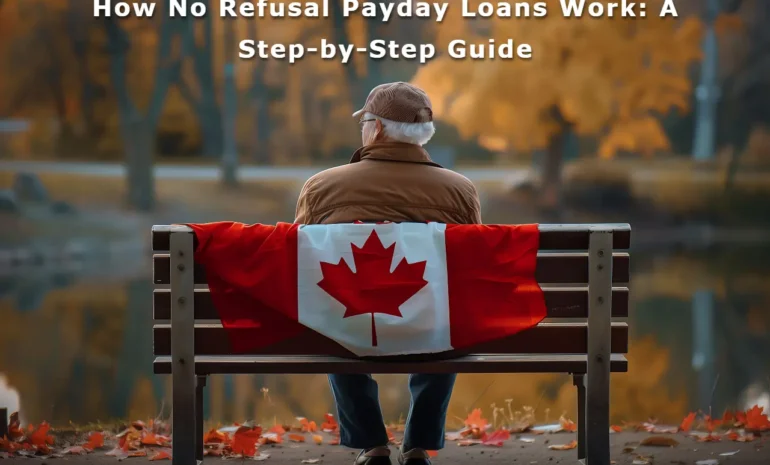Financial emergencies can happen without warning. A car repair, an unexpected bill, or a temporary income gap can leave many Canadians searching for quick cash.
For people with poor credit and limited borrowing options, no refusal payday loans are often advertised as an easy solution. These loans are commonly promoted with phrases like “guaranteed approval” or “24/7 instant cash.”
While they may provide fast access to money, it’s important to understand how these loans actually work, what they cost, and who they are — and aren’t — suitable for.
What Are no refusal payday loans Canada?
“No refusal payday loans” is a marketing term used to describe payday loans with very high approval rates.
In reality:
- No loan is truly guaranteed
- Approval is usually based on income and banking history, not credit score
- These are still regulated payday loans, not free money
Most payday loans in Canada are:
- Short-term
- Small-dollar (usually $100 to $1,500)
- Due on your next payday
They are designed for short-term emergencies, not ongoing financial needs.
How No Refusal Payday Loans Work in Canada
The process is usually simple and fast, which is why many people turn to these loans during emergencies.
1. Application
Borrowers typically provide:
- Basic personal information
- Proof of income (job income, self-employment, or government benefits)
- An active Canadian bank account
Most applications are completed online, without phone calls or paperwork.
2. Approval and Funding
Payday lenders usually do not perform traditional credit checks. Instead, they focus on:
- Regular income
- Ability to repay by the next payday
Because of this, decisions are often made quickly, and funds may be sent by e-Transfer the same day.
3. Repayment
Repayment is usually scheduled for your next payday.
- The loan amount plus fees is automatically withdrawn
- Missed payments can result in NSF fees and additional charges
- Extensions or rollovers may increase the total cost
This short repayment window is where many borrowers experience problems.
The Real Cost of Payday Loans in Canada
Payday loans are one of the most expensive legal borrowing options in Canada.
Instead of traditional interest, lenders charge a fee per $100 borrowed, capped by provincial law.
Typical characteristics:
- Loan amounts: $100–$1,500
- Repayment term: 14 to 62 days (varies by province)
- Fees charged upfront, not annually
Even when legal, the effective annual percentage rate (APR) can exceed 300%.
Zingo Cash connects you with lenders who won’t say no—if you meet basic income requirements, you’re likely to get approved.
Who Can Qualify Payday Loans?
- Canadians aged 18+
- People with poor credit or no credit history
- Government benefit recipients (like EI or ODSP)
- Self-employed or part-time workers
If you’ve been refused before, Zingo Cash helps you find a lender that says YES.
Payday Loan Fees and Interest Rates by Province (Canada)
| Province | Max Fee per $100 Borrowed | Approx. Annual Percentage Rate (APR) | Maximum Loan Term |
|---|---|---|---|
| Ontario | $15 | ~390% | 14 to 31 days |
| Alberta | $15 | ~390% | Up to 62 days |
| British Columbia | $15 | ~390% | Up to 62 days |
| Manitoba | $17 | ~442% | Up to 62 days |
| Saskatchewan | $17 | ~442% | Up to 62 days |
| Nova Scotia | $17 | ~442% | Up to 62 days |
| Newfoundland & Labrador | $14 | ~365% | Up to 62 days |
| New Brunswick | $15 | ~390% | Up to 62 days |
| Prince Edward Island | $25 | ~650% | Up to 62 days |
| Quebec | Max Legal Rate: 35% APR | 35% max APR – payday loans not allowed | 90+ days (installment loans only) |
| Territories | Varies | Varies | Varies |
How Payday Loan Fees Work in Canada (Quick Overview)
Payday loans in Canada don’t usually quote traditional interest rates like credit cards. Instead, lenders charge a fee per $100 borrowed, capped by provincial law.
Typical features:
- Small loan amounts (usually $100–$1,500)
- Very short repayment terms (often 14 days)
- Fees charged upfront, not annually
Even when legal, payday loans remain one of the most expensive ways to borrow.
Lenders cannot legally charge more than these amounts—but additional bank fees (like NSF charges) can still apply if payments fail.
Pros and Cons of No Refusal Payday Loans
Potential Benefits
✔ Fast access to emergency cash
✔ Minimal approval requirements
✔ Available to people with poor or no credit
✔ Convenient online application
Serious Downsides
✖ Extremely high borrowing costs
✖ Very short repayment period
✖ Risk of overdrafts and NSF fees
✖ Easy to fall into repeat borrowing
✖ Not suitable for long-term financial problems
Payday loans solve a short-term cash gap, but they often create long-term financial stress.
Who Should Avoid Payday Loans
Payday loans are generally not recommended if you:
- Already struggle to cover monthly expenses
- Rely on payday loans repeatedly
- Have unstable or irregular income
- Are using loans to pay rent, groceries, or utilities
- Cannot confidently repay the loan on your next payday
In these situations, the risk of a debt cycle is high.
Provincial laws regulate payday lending in Canada, and each province has specific rules regarding interest rates and lending practices. Ensure the lender is licensed and follows government regulations to avoid predatory lending.
Important Things to Consider Before Applying
If you decide a payday loan is your only option:
- Calculate the total repayment, not just the loan amount
- Confirm the lender is licensed in your province
- Read all terms carefully, including fees and penalties
- Avoid rollovers or repeat borrowing
- Have a clear repayment plan before accepting funds
Payday loans should be used sparingly and cautiously.
How to Apply Refusal Payday Loans
Step-by-Step Application Process
- Fill out the online application form
- Connect your bank securely via IBV (or upload proof of income)
- Get approved within minutes
- Receive funds via instant e-Transfer
What You Need to Apply
- Valid government-issued ID
- Active bank account
- Regular income (job, self-employed, or benefits)
Final Thoughts:
No refusal payday loans in Canada may offer fast access to cash, but they come with high costs and real risks. They are not a long-term financial solution and are best viewed as a last resort.Understanding how these loans work—and being honest about their downsides—helps you make better financial decisions and avoid unnecessary hardship.
Building emergency savings, exploring lower-cost credit options, and seeking financial guidance remain the most reliable ways to protect your financial well-being.


